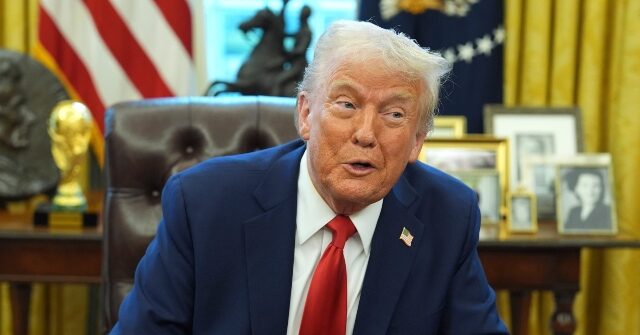China’s state-run Global Times on Sunday rounded up ministers and business leaders to condemn President Donald Trump’s ten percent tariff on imports from China, which were scheduled to take effect on Tuesday.
“China’s position is firm and consistent. Trade and tariff wars have no winners. The U.S.’ unilateral tariff hikes severely violate WTO rules. This move cannot solve the US’ problems at home and more importantly, does not benefit either side, still less the world,” the Chinese Foreign Ministry said.
The Foreign Ministry insisted China has “one of the strictest and most thorough drug control policies in the world,” so the fentanyl crisis is a “U.S. issue,” not China’s problem. Fentanyl was one of the major reasons Trump cited for imposing tariffs.
“The U.S. should address its fentanyl crisis objectively and rationally, rather than using tariffs to pressure other nations. Additional tariffs are not constructive and will undermine future cooperation on drug control,” the Foreign Ministry said.
The Chinese Ministry of Commerce (MOFCOM) said it would file a lawsuit against Trump’s tariffs with the World Trade Organization (WTO) and would also “take corresponding countermeasures to firmly safeguard its rights and interests.”
“China is strongly dissatisfied with and firmly opposes U.S. tariffs imposed on Chinese goods,” MOFCOM said.
“China urges the U.S. to correct its erroneous practices, meet the Chinese side halfway, confront issues directly, engage in candid dialogue, strengthen cooperation, and manage differences based on equality, mutual benefit, and respect,” MOFCOM added.
Similar objections were raised by the China Council for the Promotion of International Trade (CCPIT) and the Ministry of Public Security, both of which insisted that China has nothing to do with the flow of deadly fentanyl into the United States.
“The root cause of the fentanyl crisis in the U.S. lies in itself, and reducing domestic drug demand and strengthening law enforcement cooperation are the fundamental solutions,” a spokesperson for the Ministry of Public Security said.
The Global Times on Sunday ran an editorial from Ji Wenhua, a professor at the Beijing University of International Business and Economics. Ji insisted Trump’s tariffs violate the “Most Favored Nation” status China holds under WTO rules.
“The US additional tariffs on Canada, Mexico, and China are clearly discriminatory in nature. Substantial tariffs on products from specific countries and exclusion of Chinese products from the tariff levels for other WTO members clearly violate the MFN treatment,” Ji argued.
Ji conceded the WTO allows exceptions for unilateral tariffs in cases of “threats to public health or national security,” which explains why every Chinese official and editorialist is furiously denying China has anything to do with the fentanyl crisis.
Ji concluded by predicting Trump’s tariffs would “backfire” by causing “increased prices for imported goods, increasing burdens on American consumers and undercutting the competitiveness of US companies globally.”
Shares of Apple fell on three percent Monday over fears that Trump’s tariffs would add major costs to the company’s supply lines in China. Only Elon Musk’s Tesla saw a larger drop in market value on the last day of trading before the tariffs take effect.
Apple has actually taken steps to diversify its supply chains since the first Trump administration, moving some of the assembly lines for its products to Vietnam, Malaysia, and India. Some analysts predict Apple could keep the damage to its earnings down to less than one percent, without raising prices to consumers, by shifting more production to the other countries it chose for “de-risking” those Chinese supply chains.
If other companies followed suit, Trump’s tariffs might have the near-term effect of turbocharging the de-risking movement away from China. The response to such a development from Chinese editorialists and ministers would probably be far less smug and arrogant in character.
Read the full article here


